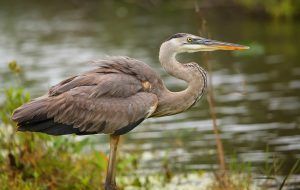Rivers Coalition Meeting Recap
Walter Deemer • May 29, 2024
Meeting - May 24, 2024
 This month’s Rivers Coalition meeting focus was on the ever-present threat cyanotoxin (blue-green algae) poses to the St. Lucie River and Estuary and the problems monitoring it.
This month’s Rivers Coalition meeting focus was on the ever-present threat cyanotoxin (blue-green algae) poses to the St. Lucie River and Estuary and the problems monitoring it.
The good news: Federal cyanotoxin standards are already in place. They were established five years ago by the Federal Clean Waters Act so states could detect threats before an actual bloom occurred.
The bad news: Florida has ignored those standards. (Technically, the Florida Department of Environmental Protection isn’t required to accept those cyanotoxin standards --- but is required to explain why not. It hasn't.)
According to federal law, the Army Corps of Engineers is responsible for the quantity of water in the Lake Okeechobee system -- but the state of Florida is responsible for the quality of that water. Since Florida doesn’t have any standards for harmful toxin levels, water monitoring is inadequate and, when harmful algae is present, public notifications are sporadic.
Environmental groups think the time has come to take action.
“Five years is enough”, said Jason Totolu, the Senior Attorney at the Center for Biological Diversity. That organization is heading a multi-group effort formally requesting, via petitions, that the U.S. Environmental Protection Agency step in and set limits on algae toxins in Florida. The goal: Help protect both human and aquatic life health and, with water management agencies adhering to those standards, prevent toxin laden water from being discharged into rivers and the ocean.
The Rivers Coalition is supporting this effort on behalf of its 106 member organizations. At some point in the EPA review process, though, letters of support from the general public will be appropriate. I’ll let you know when that time comes.
In other developments:
* The more than five-year process of developing a new Lake Okeechobee System Operating Manual, which will replace the current 2008 version -- and which is much more environmentally-friendly -- is finally nearing the finish line. The Army Corps of Engineers expects to sign the final version and implement it in mid-August.
* Lake Okeechobee, thanks to a very helpful dry season, has dropped to 13.2 feet – three feet lower than it was in March. The Corps is “very optimistic” they can get through the hurricane season without needing to do any discharges. (They know as well as we do that the media has been deluging us with forecasts of a much more active hurricane season than usual – but the real issue isn't how many there are but how many end up affecting our area.)
* The City of Stuart is installing 300 oyster beds along the Riverwalk.
* The South Florida Water Management District is starting to monitor health, fish and plant life criteria much more intensively than in the past. This will give water managers much more data to incorporate in their decision-making process.
But the good news is that health issues are being weighed much, much more heavily in managers’ decision-making process now than in the past. It’s not just gallons of water any more.
-- Walter Deemer

The featured presenter at the January 22nd Rivers Coalition meeting was Army Corps of Engineers Jacksonville District Commander Col. Brandon Bowman. He reported: * The Lake Okeechobee management effort is going well. The lake level is currently a near-ideal 13.01 feet. In addition, following last summer’s Lake Recovery Operation, Submerged Aquatic Vegetation (“sea grass”) now covers 20,000 acres of the lake bottom compared with just 3000 acres beforehand. * All stakeholders but one are having their needs met at the present time: The Caloosahatchee River west of the lake isn’t receiving nearly as much fresh water as it needs. * The biggest threat to the St. Lucie Estuary right now isn’t discharges from Lake Okeechobee; it’s polluted runoff flowing into the headwaters of the North Fork. The Corps has several projects underway to address that issue. * The Everglades restoration effort continues moving forward, albeit at a seemingly-glacial pace. To wit: Col. Bowman was happy to announce that the Everglades Agricultural Area projects would be completed five years ahead of schedule – but that still won’t be until the end of 2029. * The big C-44 Reservoir, just north of the St. Lucie Canal in western Martin County, is a key part of the management plan. The reservoir will store runoff and remove phosphorus before discharging the water. Unfortunately, it hasn’t been able to operate at capacity; there’s a seepage issue at one end, and it can only be filled to ten feet compared with its designed fifteen-foot level. The Corps doesn’t think the reservoir will be able to be filled to capacity until 2032. * Finally, Coalition members expressed a great deal of alarm about the Corps’ Engineering Research and Development Center’s plan to develop treatments to remove peroxide and phosphorus from the water. The concern stems from the ERDC’s need to test those treatments, and they have to do the testing in the St. Lucie Canal. There was widespread fear that this could produce harmful results in our canal and our estuary. On the legislative front, Gil Smart, the Friends of the Everglades monitor of the goings-on in Tallahassee, shook his head: “If last year’s legislative session’s theme was facilitating sprawl, this year’s is sprawl on steroids.” A disturbingly large number of bills have been filed that will allow more and more development projects to be subject only to administrative approval rather than, as now, being required to go through a public review process. If these bills pass they will drastically reduce public input on some very big and impactful development proposals -- and completely eliminate it in some cases. As these and other really bad bills get rammed towards the finish line, you will undoubtably be receiving calls for action from your favorite environmental organization. Keep an eye on your inbox. -- Walter Deemer, LWVMC Rivers Coalition Representative

